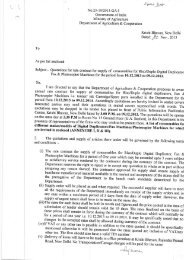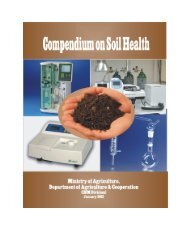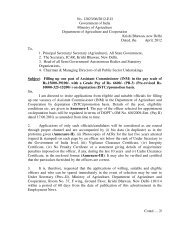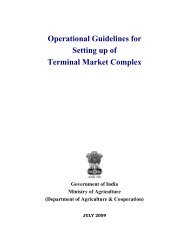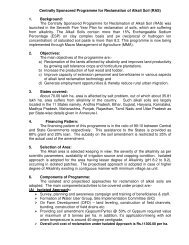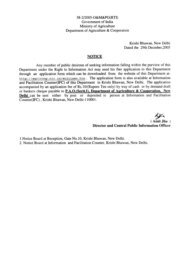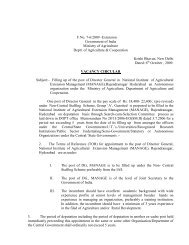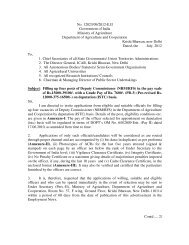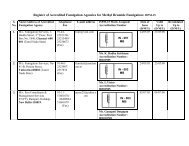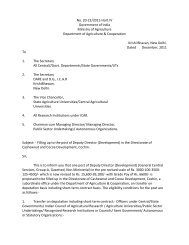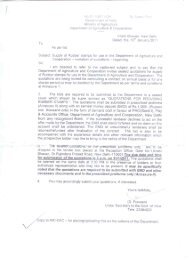Annual Report 2009-2010 - Department of Agriculture & Co-operation
Annual Report 2009-2010 - Department of Agriculture & Co-operation
Annual Report 2009-2010 - Department of Agriculture & Co-operation
Create successful ePaper yourself
Turn your PDF publications into a flip-book with our unique Google optimized e-Paper software.
<strong>Annual</strong> <strong>Report</strong> <strong>2009</strong>-<strong>2010</strong><br />
32<br />
research institutes have collected about 4,225<br />
Candidate Plus Trees(CPT)/superior genotypes <strong>of</strong><br />
TBOs, i.e., jatropha (2,844), karanja (938), wild<br />
apricot (393) and cheura (50), which have a high<br />
yield and oil content. A total <strong>of</strong> 1,234 CPTs/<br />
superior genotypes have been cryo-preserved in<br />
the National Gene Bank at NBPGR, New Delhi.<br />
Besides, efforts have also been made for DNA<br />
fingerprinting and molecular characterisation <strong>of</strong><br />
these TBOs. Propagation techniques through<br />
seeds and cuttings have also been developed<br />
for various TBOs. A standard package <strong>of</strong><br />
practices for jatropha, karanja, wild apricot, and<br />
cheura are being standardised. Varietal<br />
development is being made through mass and<br />
recurrent selection by using 59 superior<br />
genotypes under different agro-climatic<br />
conditions. Under the hybridisation programme,<br />
first generation jatropha hybrids have been<br />
developed by crossing jatropha curcas and<br />
jatropha integirrima. 39 hybrid clones were<br />
evaluated, which showed wide variation in their<br />
morphological trades. The evaluation <strong>of</strong> these<br />
hybrids is under progress. Success has been<br />
achieved in regenerating jatropha plants through<br />
tissue culture. The development <strong>of</strong> commercially<br />
viable tissue culture <strong>of</strong> jatropha for massmultiplication<br />
is in progress. The protocols<br />
related to detoxification <strong>of</strong> seed cakes <strong>of</strong><br />
jatropha, karanja, and simarouba are almost<br />
nearing development. Post-harvest equipment,<br />
i.e., decorticator, oil expeller, and<br />
transesterification, have been developed. About<br />
2000 seed samples <strong>of</strong> various TBOs have been<br />
analysed for oil content. For creating awareness<br />
among farmers, entrepreneurs, and other<br />
stakeholders, 281 farmers' training and 95<br />
trainers' training programmes have been<br />
organised. Besides, three R&D reports and<br />
booklets on jatropha, karanja, wild apricot, and<br />
cheura have already been published by the<br />
NOVOD Board.<br />
4.48 Under the R&D programme, 57 superior<br />
genotypes are under national trials across the<br />
country in various agro-climatic conditions, as a<br />
result <strong>of</strong> which, location specific high yielding<br />
varieties are expected to be developed. The<br />
development <strong>of</strong> a commercially viable protocol<br />
for tissue culture in jatropha is also expected<br />
soon. Developed hybrids are under evaluation,<br />
and their genetic traits and yields are expected<br />
to be established. Packages <strong>of</strong> practices for<br />
various TBOs have been standardised, and these<br />
have been published. <strong>Co</strong>mplete detoxification <strong>of</strong><br />
seed cakes <strong>of</strong> jatropha, karanja and simarouba<br />
is expected in the coming year, leading to their<br />
use as cattle feed.



